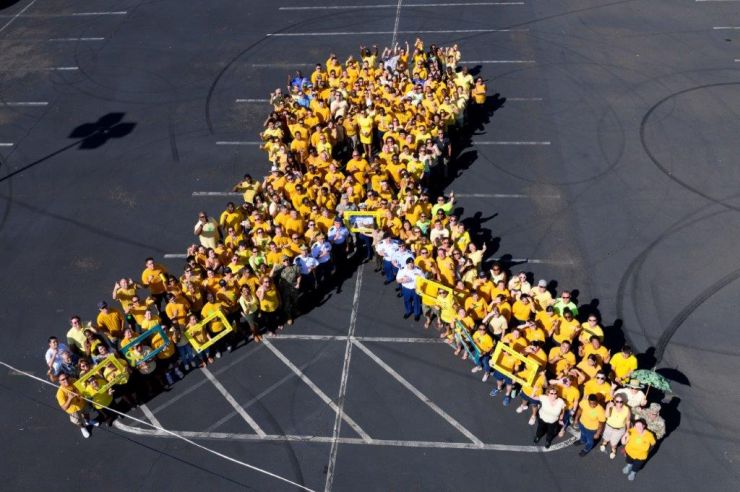
Hawaii-based service members from every branch of the military, DoD personnel and military/DoD families form a yellow suicide awareness ribbon in support of National Suicide Prevention Awareness Month at Joint Base Pearl Harbor-Hickam. (U.S. Navy photo by Mass Communication Specialist 2nd Class Charles Oki)
Aiko Rose Brum
U.S. Army Garrison Hawaii
HONOLULU – September is Suicide Prevention Awareness Month, and Oahu’s joint services want to ensure service members, their families, civilians and contractors are using the bulk of resources available to prevent suicide.
Numerous resources are available, here. However, simply put, a most important resource is a person who is trustworthy and who will listen and communicate, especially when someone else seems to be in trouble. That was the message stated repeatedly during the 2019 Joint Services Suicide Prevention Proclamation Ceremony and Human Awareness Ribbon, Sept. 10, outside the Navy Exchange.
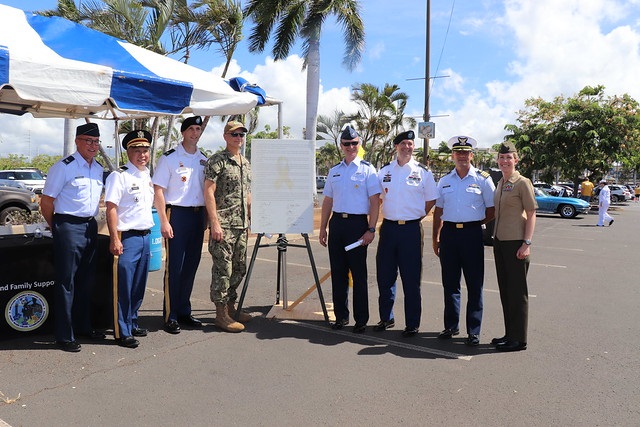
All service commanders on Oahu, including the Coast Guard, gather for a photo by the 2019 Suicide Prevention Proclamation. U.S. Army Garrison Hawaii's commander, Col. Thomas Barrett, is standing third from right. (Photo by Aiko Rose Brum, U.S. Army Garrison Hawaii Public Affairs)
“We, as military members from all branches, are one family,” said Navy Capt. Jeff Bernard, commander, Joint Base Pearl Harbor-Hickam. “The family that works together is the family that fights together and the family that survives together. We can save lives … and encourage healthy behaviors.”
Bernard’s remarks began several talks from speakers who told personal stories that aimed to inspire anyone in a dark place to listen and get some help with their issues.
“Every suicide affects, on average, 135 different people,” said retired Air Force Col. Rob Swanson, the keynote speaker. “The people who get into that dark place think they’re doing the world a favor. They don’t want to seek help; they just want to check out. Nothing could be farther from the truth.
“If you could realize the aftermath and the impact that suicide has on friends and family, it might give you pause,” Swanson added, explaining that anyone in the military can become a victim, from privates, airman and seaman recruits to general and flag officers.
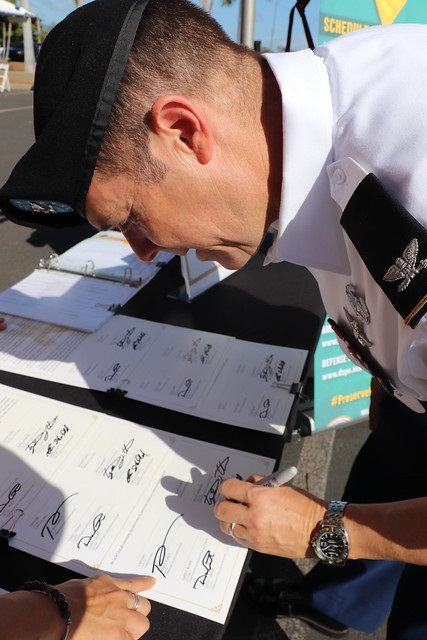
Col. Thomas Barrett, commander, U.S. Army Garrison Hawaii, signs the suicide prevention proclamation prior to the joint ceremony, Sept. 10, 2019. (Photo by Aiko Brum, U.S. Army Garrison Hawaii Public Affairs)
“Think about the worst time you’ve ever had in your entire life, and life always gets better,” Swanson said, after recounting his own personal story.
Each speaker noted it's okay to be weak; it's okay to ask for help. The individual, however, must have the courage to seek help when needed.
Numerous situations can cause anyone to think about suicide. But not everyone shows the signs of suicidal behaviors, such as depression, losing weight, giving things away, violence or hostility, substance abuse and relationship failures, and many more behaviors.
“So how do we intercede in someone’s life?” asked Col. W. Halsey Burks, 15th Wing commander.
He suggested we can take a resiliency pause and focus on connectivity.
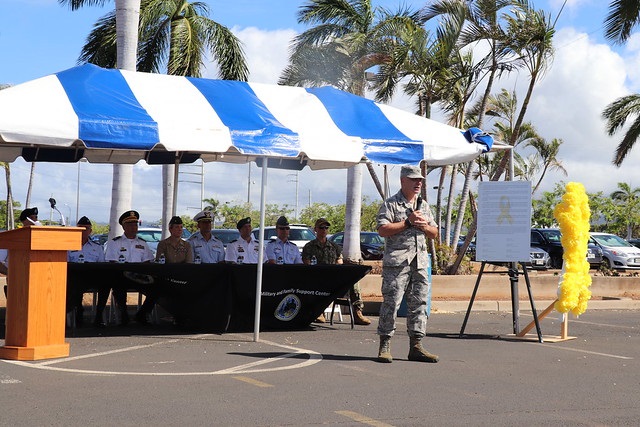
Retired Air Force Col. Rob Swanson, the keynote speaker, speaks to the audience at the joint ceremony. (Photo by Aiko Rose Brum, U.S. Army Garrison Hawaii Public Affairs)
Burks reminded everyone that most of us have influence over someone we work with, whether a peer, a subordinate or maybe even a superior. Each of us have a story to tell and we should share it if it would help another, especially when a situation seems to call for more communication.
“You’re important,” said Swanson. “You’re important to me, you’re important to your friends, your family, your coworkers, your nation, your service. You are so important. Stick around. Stay alive, please.”
Numerous tools are available, including Military and Family Support Centers, Military OneSource, chaplains, consultants, hotlines and more.
Visit the Defense Suicide Prevention Office at https://www.dspo.mil/ or the Army Suicide Prevention Program at https://www.armyg1.army.mil/hr/suicide/. Call the Military or Veterans Crisis Line at 1-800-273-8255 and press 1. Call the National Suicide Prevention Lifeline at 1-800-273-TALK (8255).
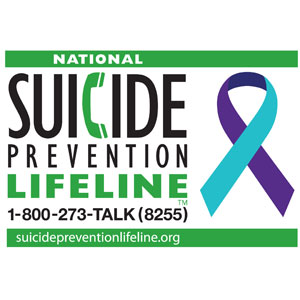
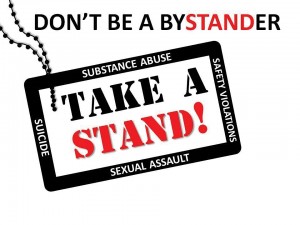
Service members, families, civilians and contractors
can call the National Suicide Prevention Lifeline whenever
they need to talk to someone. (Courtesy graphics)




